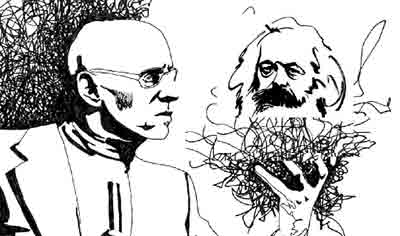Tuesday, May 10, 2022
Boys Becoming Men, Men Becoming Wolves: on The Wolf of Snow Hollow and Werewolves Within
Sunday, May 01, 2022
Elites and Capital: or, Foucault and Marx Again
Thursday, April 21, 2022
If Althusser was a Spinozist...: on Juan Domingo Sánchez Estop's Althusser et Spinoza
One of Althusser's fundamental lessons, and one that remains beyond the controversies about epistemic breaks, the young Marx, and the real Marx, is that Marx's philosophy and politics must be located not at this or that isolated quote or passage, but as traversing the entirety of his work. The condition of immanent causality is a reading of philosophy itself as the immanent unfolding of ideas that are all the more important because they are pervasive, located not in this or that passage, but in the entirety of the work. To some extent Juan Domingo Sánchez Estop's Althusser et Spinoza: Détours et Retours does a similar work on Althusser, searching for Althusser's Spinozism not just in the few well known passages in the ISA essay, Lire Le Capital, and Elements of Self-Criticism where Spinoza is cited by name, but also in the way that Spinoza's thought or practice of philosophy traverses Althusser's work.
Tuesday, April 19, 2022
Gonna Leave You All Severed: Initial Reflections on Severance
I was slow to get to Severance. Partly this has to do with conditions of contemporary cultural consumption. The shift from movies to television and from television to streaming, accelerated by the pandemic, has raised particular hurdles to watching new television shows even as everything can be viewed from one's home. Every new show comes with the subscription to a new service (or a way to work around it) and the proliferation of these services with their own branding and marketing enough to make me miss the catholic nature of movie theaters. Of the different services I had particular disdain for Apple TV, mostly due to the cross brand marketing and the lingering aftertaste of itunes as an app. Anything that could immediately disseminate a U2 album should not only be shunned but the people who made it should be banished.
Wednesday, March 30, 2022
Operation Blue Thunder: Or, First time as Violence, Second time as Action
Recently in a bit of odd exhaustion and insomnia I watched, or rather rewatched, the movie Blue Thunder. In case you have not seen it I will tell you the plot. It stars Roy Scheider as a LAPD helicopter pilot and Vietnam vet. He is introduced to a helicopter with the code named "Blue Thunder" which is part of an increased security preparations for the 1984 Olympics. The helicopter is an armored attack and surveillance helicopter complete with a machine gun, powerful directional microphones, and infrared cameras. Over the course of the movie, and I am hazy on the details or may have fallen asleep, Scheider comes to the realization the helicopter is not only an unacceptable militarization of the police but would function as the basis of an intolerable expansion of powers of the state's powers of surveillance. After the requisite helicopter dog fights and car chases he parks the helicopter in front of a freight train and destroys it.
Thursday, March 24, 2022
Two Great Tastes Part Two: The Introduction to Fischbach's La Production des Hommes
Sunday, March 06, 2022
Imagination, Fiction, Knowledge: Towards a Spinozist Theory of Cultural Production Part II (This Time it is Mythical)
Tuesday, February 22, 2022
Any Bird Whatsoever: on Fujita's Le Ciné-Capital: D'Hitchcock à Ozu
Thursday, February 03, 2022
Are Geeks Born or Made: On Nightmare Alley (movies and the book)
Saturday, January 22, 2022
Looking Back in the Mirror of Production: An Introduction to an Unwritten Book on Deleuze and Guattari and Marx
Saturday, January 15, 2022
Despair and Indignation: The Inevitable Reflection on Covid (with Marx and Spinoza)
Monday, December 27, 2021
Get Meta With Me: On Matrix Resurrections
The Matrix is a film about work. Long before Neo escapes the matrix he has to break out of a much more mundane space of confinement, the office cubicle. The film is thus part of that odd series of films that came out in 1999 that were about the confines of the cubicle and the working day, a list that includes Office Space, Fight Club, and American Beauty (and Being John Malkovich). It was an odd year, in the midst of the dot-com bubble and the Clinton third way, a year that on the surface was good for capitalism, the movies were telling a different story, a story in which work and the office was sucking the life out of people. An idea which The Matrix made literal in its dystopian future of energy sucking pods, in other words, cubicles 2199.
Saturday, December 18, 2021
Red Spinozism II: Lordon Vs. Fischbach
Sunday, December 05, 2021
Homework: Three Recent Books on Work
Thursday, November 18, 2021
Shine On: We Are All in Room 237 Now
Of all of the various concepts and neologisms that populate A Thousand Plateaus that of the "regime of signs" is one that never really caught on. It has not had the same effects as nomadology, rhizome, virtual, assemblage, body without organs, become etc., If I had to offer a quick explanation of this it is perhaps because the idea of the sign, and of a regime of signs, still seems like a remnant of an earlier period, more structuralist than post-structuralist. It is for that reason that it has remained something of a B-side or a deep cut, taking a clue from Deleuze and Guattari's assertion that the book is more like album with different plateau songs than a linear progression.
Friday, November 12, 2021
Other Scenes: Balibar and Tosel on Class Struggle and the Struggle over Identity
Wednesday, October 13, 2021
The Dialectic of Conspiracy and Trust: Hegel and Conspiracy Theories
This post is an immediate follow up or even sequel to an earlier post on Spinoza and conspiracy theories. In a more oblique way it is also a follow up to something that I have said repeatedly on this blog, that not only is there more to Hegel's Phenomenology of Spirit than the master and slave, but that other dialectical scenes or figures can also be wrested from the linear progression of Hegel's thought to become the basis of social and political criticism. Kojeve can't have all of the fun.
Friday, October 01, 2021
Coming Soon (well soonish): The Double Shift
Sunday, September 19, 2021
Reworking Hegel: Philosophies of Work in Macherey's Petit Riens
There is a line that I used to attribute to Roland Barthes, "those who do not reread are doomed to read the same book over and over again." I liked the riddle like nature of the phrase, and the way it seemed to posit a first read which is often a restating of one's already existence preconceptions, hence the rereading of the same book under different covers, against a rereading that discovers difference in repetition.
Wednesday, August 25, 2021
Fighting for Subjection as if it was Rebellion: Spinoza and Servitude Today
As I have already indicated on this blog more than once, Spinoza's formulation of subjection remains in some sense a guiding question for me.
"...the supreme mystery of despotism, its prop and stay, is to keep men in a state of deception, and with the specious title of religion to cloak the fear with which they must be held in check, so that they will fight for their servitude as if for salvation, and count it no shame but the highest honour, to spend their blood and lives for the glorification of one man…" --Spinoza, Tractatus Theologico-Politicus 1670
So much so that I would be willing to agree with Gilles Deleuze and Félix Guattari when they repeated it three hundred years later.
"That is why the fundamental problem of political philosophy is still precisely the one that Spinoza saw so clearly, and that Wilhelm Reich rediscovered: “Why do men fight for their servitude as stubbornly as though it were their salvation?” --Gilles Deleuze and Félix Guattari, Anti-Oedipus: Capitalism and Schizophrenia 1972
However, I have begun to think that it is time to update the question, or at least change its formulation, it increasingly seems to me that in the current era it is not so much servitude that is fought for as salvation, but subjection that is fought for as rebellion, or misrecognized as rebellion.





















